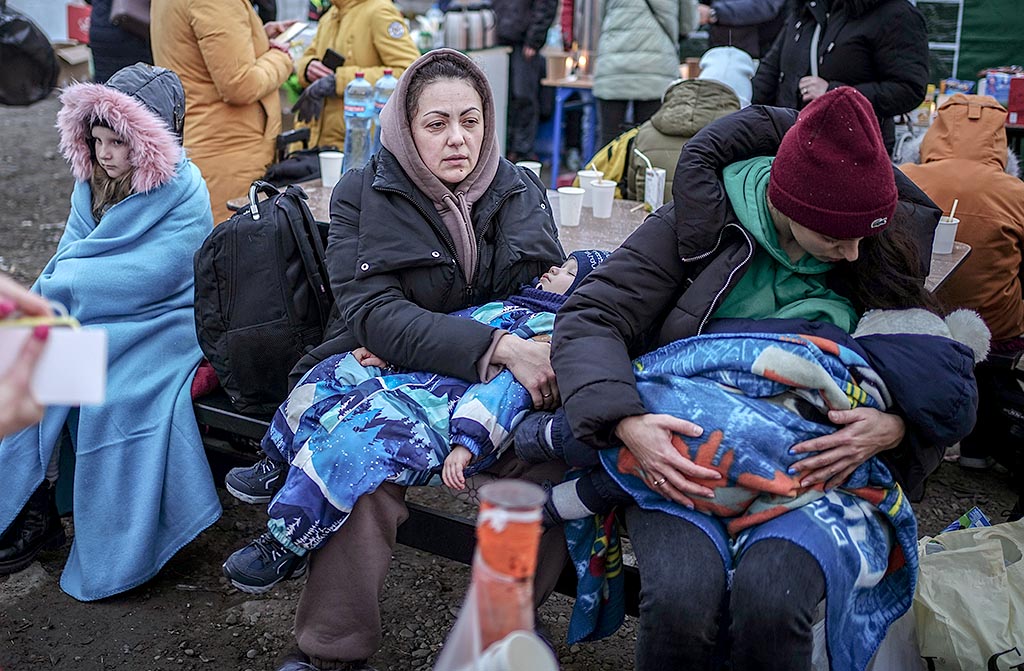By: P.T., STA
The Interior Ministry will propose the government activate an article that will provide immediate temporary protection to Ukrainian refugees by Friday, Minister Aleš Hojs announced on Tuesday.
The ministry is working on a regulation whereby the government would activate the temporary protection of displaced persons act after EU home affairs ministers last week agreed to activate the temporary protection directive for the first time ever.
New in Slovenia? Connect with others on the Expats in Slovenia Facebook page
The directive means that refugees from Ukraine will be granted a temporary residence permit in the EU, access to the labour market, accommodation, education, social care and healthcare.
Slovenia already has the relevant act, but the government needs to take a special decision to activate it. The minister hopes it will be activated by Friday at the latest.
The activation will speed up protection granting procedures, Hojs said, adding that Ukrainian refugees would not be required to ask for international protection on their arrival in Slovenia.
Nataša Potočnik, the head of the migrations directorate, told Radio Slovenija that the mechanism would be available to those who were a resident of Ukraine on 24 February 2022, meaning both Ukrainian citizens and other citizens living in the country at that time would be eligible to be processed under the mechanism.
The latter are required to prove they had an international protection status or a residence permit in Ukraine at the time and cannot return to their country of origin.
Those who have already lodged an application for international protection under the regular procedure, which usually takes more time, can opt out of this and choose to be processed under the temporary protection mechanism, she said.
Temporary protection can be granted for one year with the possibility to be renewed twice. While having a temporary protection status, people can apply for international protection, she added.
The ministry provided police data this afternoon showing that 502 Ukrainian nationals had asked for international protection in Slovenia through Monday.
Even more are travelling through Slovenia. “According to the available data, we estimate that several thousand refugees transit through Slovenia per day,” the police said. Hojs said earlier that most were headed to West European countries.
The minister announced that an information system would be put in place to register refugees from Ukraine, “so it’s clear where and who is accommodated and whether they are still in Slovenia”.
There has so far been no agreement on potential relocation of Ukrainian refugees between EU countries as Poland said it would sustain the pressure itself.
“Should the pressure of refugees increase further, Slovenia has made it clear that we are ready to accept a substantial number of refugees,” said Hojs.
Slovenia could provide capacities to accommodate between 20,000 and 30,000 refugees and take care of roughly 200,000 in total. However, at the moment accommodation is available for between 1,000 and 2,000, he estimated.
The accommodation centre in Logatec currently accommodates 135 Ukrainian refugees, including 79 children, whereas the rest are women, said Katarina Štrukelj, the head of the government Office for the Support and Integration of Migrants. The ministry is looking for new capacities to accommodate them.
The ministry itself has made available accommodation facilities at the seaside resort of Debeli Rtič with other locations to be inspected in the coming days, including in Murska Sobota in the north-east of the country.
According to Defence Minister Matej Tonin, 2,500 Ukrainian refugees are registered at private accommodations in Slovenia, with their relatives or acquaintances.
The office has launched an open call to obtain information on candidates willing to provide accommodation for refugees from Ukraine. Due to numerous enquiries, the deadline for applications has been extended until Wednesday at noon, the office told the STA.
Health Minister Janez Poklukar said that Slovenia would provide medical care for Ukrainian refugees, and that all healthcare providers had been notified that the refugees are entitled to emergency health services.
Commenting on the integration of Ukrainian children into Slovenia’s educational system, Education Minister Simona Kustec said that educational models were in place for this at primary and secondary school levels.
Depending on the flow of refugees, Slovenia will decide whether to take an individual approach in individual environments and schools, or a more systemic approach in the event of a larger refugee wave. Some Ukrainian child refugees are already being introduced into the Slovenian school system, she added.

